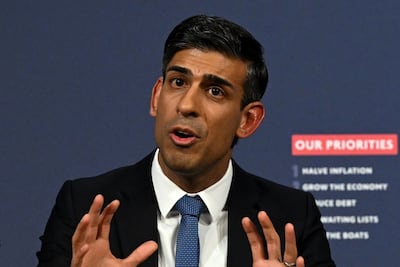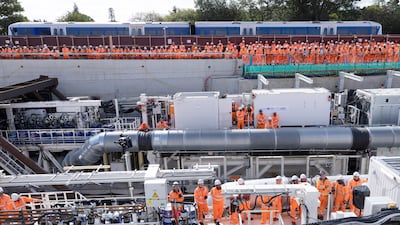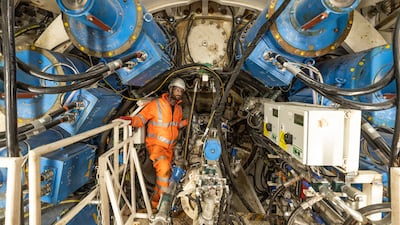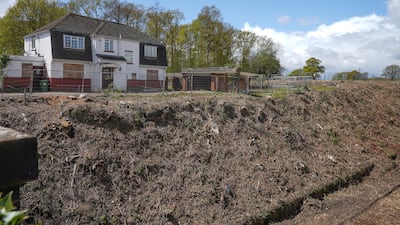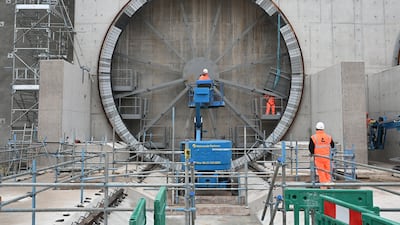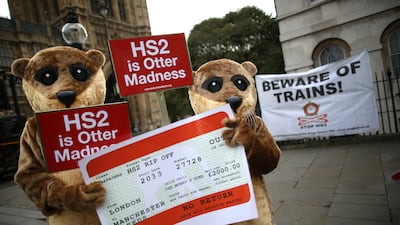Prime Minister Rishi Sunak is reportedly considering axing part of the HS2 rail link between Birmingham and Manchester due to the soaring cost of the project.
The high-speed project has long been touted as a significant new commercial link between the north and south of England, and a major upgrade to the UK's ageing rail network.
However, Chancellor Jeremy Hunt has suggested the scheme's costs are “out of control”, leading to speculation that much of the line will be scrapped in the coming days.
Leading political figures, including former prime ministers, Boris Johnson and David Cameron, and the Labour mayors of Greater Manchester and London, Andy Burnham and Sadiq Khan, have criticised any move to scrap the project.
What is HS2?
A project for a high-speed rail line linking some of the country’s largest cities, intended to connect London, the Midlands and the north of England, with construction split into three phases.
Gordon Brown’s Labour government set up HS2 Ltd in 2009 and the project has been backed by successive Conservative governments since 2010.
In 2020, then-prime minister Mr Johnson recommitted his government to the scheme following a review.
What has it cost so far?
In 2013, HS2 was estimated to cost £37.5 billion ($45.88 billion) according to 2009 prices but the sums have continued to rise.
A budget of £55.7 billion for the whole of HS2 was set in 2015 but some reports suggest costs have now surpassed £100 billion, having been driven up by recent inflation rises.
Why was it created?
Many supporters of HS2 say the main benefit will be increased capacity.
It will enable intercity trains currently operated by Avanti West Coast to be taken off the West Coast Main Line, creating more space for stopping services and freight trains.
Another improvement will be reduced journey times.
What were the original plans?
Phase 1: London Euston to Birmingham Curzon Street, with intermediate stations at Old Oak Common in the western suburbs and at Birmingham Airport.
Phase 2A: To extend the line from Fradley in the West Midlands to Crewe in Cheshire.
Phase 2B: Comprising an eastern leg from the West Midlands to the East Midlands and a western leg from Crewe to Manchester.
How have the ambitions shrunk?
Ministers have already moved to pause parts of the project and even axed sections in the north.
The eastern leg between Birmingham and Leeds was reduced to a spur line that is due to end in the East Midlands.
It was confirmed in March that construction between Birmingham and Crewe would be delayed by two years and that services may not enter central London until the 2040s.
Transport Secretary Mark Harper announced that work at Euston would be paused for two years as costs were forecast to almost double to £4.8 billion.
The hiatus means Old Oak Common, in the capital’s western suburbs, will be the railway’s only London station when services to and from Birmingham Curzon Street begin between 2029 and 2033.
The Prime Minister is reportedly now considering scrapping the route from Birmingham to Manchester, with a decision on the fate of the leg north from Birmingham expected within days.
COMPANY%20PROFILE
%3Cp%3E%3Cstrong%3ECompany%20name%3A%3C%2Fstrong%3E%203S%20Money%3Cbr%3E%3Cstrong%3EStarted%3A%3C%2Fstrong%3E%202018%3Cbr%3E%3Cstrong%3EBased%3A%3C%2Fstrong%3E%20London%3Cbr%3E%3Cstrong%3EFounders%3A%3C%2Fstrong%3E%20Ivan%20Zhiznevsky%2C%20Eugene%20Dugaev%20and%20Andrei%20Dikouchine%3Cbr%3E%3Cstrong%3ESector%3A%3C%2Fstrong%3E%20FinTech%3Cbr%3E%3Cstrong%3EInvestment%20stage%3A%3C%2Fstrong%3E%20%245.6%20million%20raised%20in%20total%3C%2Fp%3E%0A
Graduated from the American University of Sharjah
She is the eldest of three brothers and two sisters
Has helped solve 15 cases of electric shocks
Enjoys travelling, reading and horse riding
MATCH INFO
Wales 1 (Bale 45 3')
Croatia 1 (Vlasic 09')
MATCH INFO
Quarter-finals
Saturday (all times UAE)
England v Australia, 11.15am
New Zealand v Ireland, 2.15pm
Sunday
Wales v France, 11.15am
Japan v South Africa, 2.15pm
Sunday's games
Liverpool v West Ham United, 4.30pm (UAE)
Southampton v Burnley, 4.30pm
Arsenal v Manchester City, 7pm
The Bio
Favourite vegetable: “I really like the taste of the beetroot, the potatoes and the eggplant we are producing.”
Holiday destination: “I like Paris very much, it’s a city very close to my heart.”
Book: “Das Kapital, by Karl Marx. I am not a communist, but there are a lot of lessons for the capitalist system, if you let it get out of control, and humanity.”
Musician: “I like very much Fairuz, the Lebanese singer, and the other is Umm Kulthum. Fairuz is for listening to in the morning, Umm Kulthum for the night.”
Company profile
Name: Tharb
Started: December 2016
Founder: Eisa Alsubousi
Based: Abu Dhabi
Sector: Luxury leather goods
Initial investment: Dh150,000 from personal savings
The specs
Engine: 5.0-litre supercharged V8
Transmission: Eight-speed auto
Power: 575bhp
Torque: 700Nm
Price: Dh554,000
On sale: now
It's up to you to go green
Nils El Accad, chief executive and owner of Organic Foods and Café, says going green is about “lifestyle and attitude” rather than a “money change”; people need to plan ahead to fill water bottles in advance and take their own bags to the supermarket, he says.
“People always want someone else to do the work; it doesn’t work like that,” he adds. “The first step: you have to consciously make that decision and change.”
When he gets a takeaway, says Mr El Accad, he takes his own glass jars instead of accepting disposable aluminium containers, paper napkins and plastic tubs, cutlery and bags from restaurants.
He also plants his own crops and herbs at home and at the Sheikh Zayed store, from basil and rosemary to beans, squashes and papayas. “If you’re going to water anything, better it be tomatoes and cucumbers, something edible, than grass,” he says.
“All this throwaway plastic - cups, bottles, forks - has to go first,” says Mr El Accad, who has banned all disposable straws, whether plastic or even paper, from the café chain.
One of the latest changes he has implemented at his stores is to offer refills of liquid laundry detergent, to save plastic. The two brands Organic Foods stocks, Organic Larder and Sonnett, are both “triple-certified - you could eat the product”.
The Organic Larder detergent will soon be delivered in 200-litre metal oil drums before being decanted into 20-litre containers in-store.
Customers can refill their bottles at least 30 times before they start to degrade, he says. Organic Larder costs Dh35.75 for one litre and Dh62 for 2.75 litres and refills will cost 15 to 20 per cent less, Mr El Accad says.
But while there are savings to be had, going green tends to come with upfront costs and extra work and planning. Are we ready to refill bottles rather than throw them away? “You have to change,” says Mr El Accad. “I can only make it available.”

